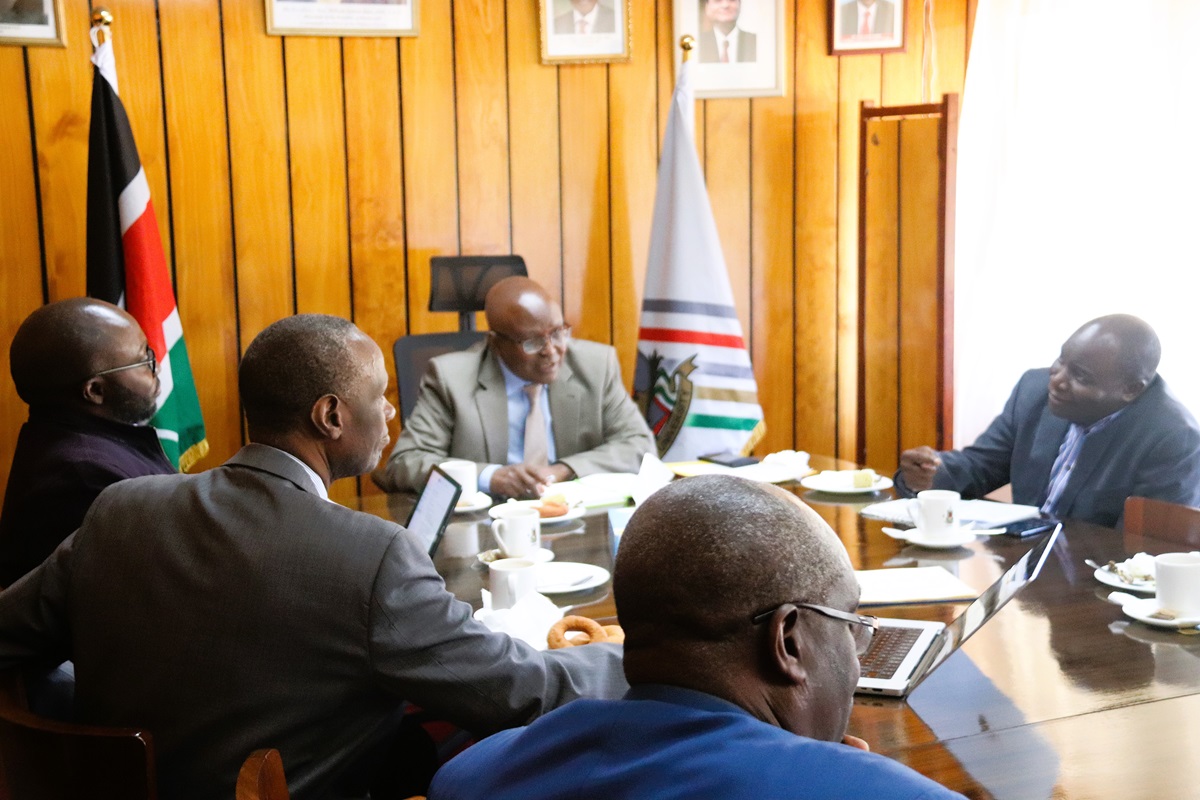Egerton University is set to enhance its medical research and teaching capabilities through a partnership with the Kenya Education Network (KENET). This collaboration will leverage digital tools to improve surgical training and data-driven research under KENET's Teaching Hospitals Connectivity Initiative, including eduroam and surgical theatre telepresence systems.
During a meeting chaired by Vice Chancellor Prof. Isaac Kibwage , KENET Executive Director Prof. Meoli Kashorda announced plans to support a champion lecturer in surgery with a small grant to develop blended content using Proximie, a platform widely used by surgical specialists. Proximie provides the necessary technical infrastructure for a more integrated approach to surgical services within hospitals. By serving as a centralized hub connecting operating room operations, the platform enhances knowledge sharing, oversight, collaboration, and strategic development.

“We will provide a small grant to one champion lecturer in surgery to develop blended learning content using Proximie. This platform is currently utilized by specialized surgical practitioners,” said Prof. Kashorda. Additionally, KENET plans to roll out eduroam WiFi coverage at the Faculty of Health Sciences.
A survey has been conducted to determine the proposed locations for Wi-Fi hotspots, materials, and equipment required, as well as additional KENET services needed for the campus and teaching hospital. Prof. Kibwage highlighted the initiative’s potential to expand digital learning beyond specialized surgical training. “A dedicated teaching staff member will be appointed to spearhead this initiative in collaboration with KENET,” he noted.
The system integrates a specialized camera and software, strategically placed for surgical training. This technology can also be incorporated into broader medical instruction at Egerton University. KENET, known for providing stable internet access to higher education institutions, views the Teaching Hospitals Connectivity Initiative as a transformative tool for medical research and training.

While a Memorandum of Understanding (MoU) exists for implementing the system at Nakuru Provincial Government Hospital, KENET suggested an additional MoU with the university to enhance collaboration. “We aim to establish a blended learning model with the university and hospital taking leadership,” Prof. Kashorda added. The facility’s recurring costs are expected to decrease as more institutions, such as the Kenya Medical Training College and neighboring universities with Medical and Nursing Schools join the initiative.
Funding for Early-Career Researchers
Egerton University researchers will benefit from small grants aimed at early-career lecturers(graduate students of five years and below). Deputy Vice Chancellor for Academics, Research, and Extension, Prof. Bernard Mulwa, highlighted that Dr. Winie Mulwa had received Ksh. 1.5 million from KENET in funding.
.
“We are not overwhelmed by applicants. Last year, 11 researchers benefited. This year, we will offer 15 grants, each worth Ksh. 1.5 million,” he explained.
The funding program incorporates new approaches integrating climate change, environmental science, and bioinformatics—disciplines requiring high-performance computing (HPC) systems due to their data-intensive nature. According to Scopus rankings, Egerton University is among Kenya’s top 10 research institutions, currently ranked third
Boosting Research Mobility and AI Integration
KENET continues to support researchers through travel grants, facilitating conference presentations and international knowledge exchange. “Our goal is to increase research mobility beyond 10 percent. We still lag behind our counterparts across the continent,” noted Prof. Kashorda. The deadline for the latest grant applications is February 28, 2025.
To enhance local data analysis, KENET is exploring the development of agricultural extension products tailored for Kenya’s workforce. “Professors in physics and engineering have raised concerns about declining fundamentals in teaching. Strengthening local capacities is crucial,” emphasized Prof. Kashorda.

KENET also highlighted Kenya’s industrial research landscape, citing institutions such as IBM’s research lab at the Catholic University of Eastern Africa, Microsoft Research Institute, Google Africa Research, and NVIDIA, which specializes in AI-driven chip manufacturing. Additionally, Amazon is offering health equity grants that universities can leverage for cloud computing resources.
“The country is in the process of establishing an AI strategy. We propose an AI Research and Innovation Centre through our member partners to ensure they stay ahead,” Prof. Kashorda added. The initiative aims to take a multidisciplinary approach, encompassing medicine, agriculture, chemistry, and other sciences.
Maximizing Access to Research Resources
KENET urged Egerton University’s faculty and students to utilize Research4Life journals, a World Bank-funded repository covering disciplines such as agriculture, medicine, justice, science, and technology. “We shall continue working with institutions with active IdPs to activate SSO access for journals and research resources,” Prof. Kashorda noted. KENET also plans to arrange virtual workshops for users in partnership with KLISC between April and June 2025.
Improved Connectivity
KENET’s new 10 Gb/s circuit to Paris enables seamless research collaboration with Europe, America, Asia, and Africa. Direct peering with Internet2 and a 40 Gb/s international capacity boost high-speed data exchange, strengthening Egerton’s research impact. National backbone upgrades further enhance connectivity, ensuring the university remains a leader in academic excellence and innovation.
Present at the meeting were Deputy Vice Chancellor for Administration, Finance, and Planning, Prof. Richard Mulwa; Acting Chief Finance Officer, Charles Wanjohi; and ICT Manager, Phoebe Fedha. The KENET team was led by its CEO and Digital Campus Infrastructure Engineer, Mr. Paul Nzau.
With these initiatives, Egerton University is poised to strengthen its research capacity, integrate AI into higher education, and enhance medical training programs—solidifying its position as a leader in digital learning and innovation.
By Kurian Musa, Egerton University
Email: This email address is being protected from spambots. You need JavaScript enabled to view it. / This email address is being protected from spambots. You need JavaScript enabled to view it.
Website: www.egerton.ac.ke

















